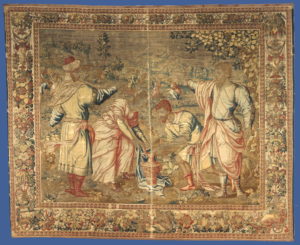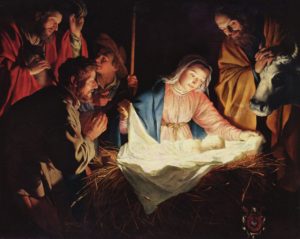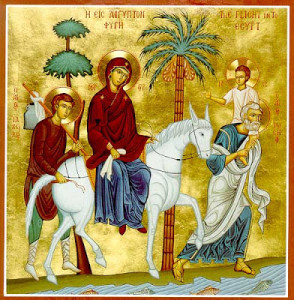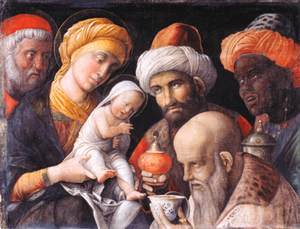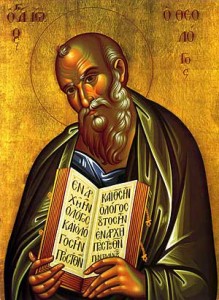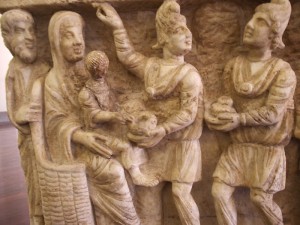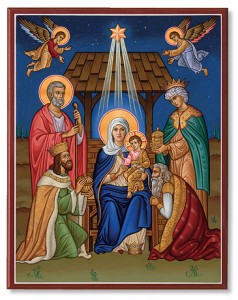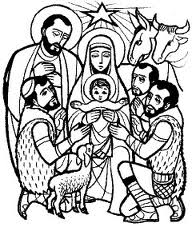Thoughts on Today’s Lessons for Dec. 25, 2017
(Readings for Lectionary Selections I, II, and III)
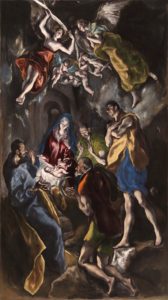
Adoration of the Shepherds (1612-1614). Oil painting on canvas by Doménikos Theotokópoulos (“El Greco”), 1541-1614. Museo del Prado, Madrid.
Christmas is here! We see a great light and sing a new song as we behold with joy in the city of David the birth of a Savior, who is the Messiah, the Lord. In our first reading, from the early chapters of Isaiah, in words that the composer Handel will borrow for “The Messiah,” the prophet foretells a glorious future when the oppressor’s yoke will broken and a child will be born for us, a son given to us, a Wonderful Counsellor to take the throne of David: Mighty God, Everlasting Father, Prince of Peace. .
First Reading, Selection II: Isaiah 62:6-12
In this first reading, the exile is ending. Through the power of God’s strong right hand and mighty arm, the people will return to Jerusalem. Prepare the way, build up the highway toward home and clear it of stones: No longer shall enemies harvest Zion’s grain and drink its wine; a glorious future of redemption and salvation that will last until the end of time.
First Reading, Selection III: Isaiah 52:7-10
Israel’s exile in Babylon is ending, and God’s messenger brings good news of peace and salvation as God leads the people back to Zion, the temple on the mountain, Jerusalem. Even the ruins of the devastated city are called to break into song. Such is the joy of God’s return to the holy city! God reigns, the people are comforted, and all the nations shall see the power of God’s holy arm and the salvation that it brings.
Psalm, Selection I: Psalm 96
All the earth sings a new song, blessing God’s name in this joyous Psalm of praise There is fascinating theology here, ideas that we may see reflected in the New Testament: We are called to proclaim the good news of God’s salvation; we are to go out and declare God’s glory, a great commission to show God’s majesty to all the nations. The whole earth, the heavens, the seas, the forests and all that is in them rejoice before our God.
Psalm, Selection II: Psalm 97
God is king, and all creation rejoices. This Psalm praises God in an image of power and might that echoes the fearsome God who led the Israelites through the desert and protected them there, surrounded by clouds, lightning and fire. This is a God over all other gods, over all other nations, but also a God who loves the righteous, provides light for them, and cares for those who live justly.
Psalm, Selection III: Psalm 98
Again we are called to stand up and rejoice in a Psalm of praise that is full of joyous music, harp, trumpets and horn. We sing a new song of praise for the victory won by God’s mighty right hand and holy arm. All the nations, not only Israel, shout with joy. Even the sea, the land, the rivers and the hills will rejoice when God comes to judge all the world with righteousness and equity. Lift up your voice! Rejoice and sing!
Second Reading, Selection I: Titus 2:11-14
Here’s a Bible Trivia fact! Titus is the only book of the New Testament that does not appear in the regular three-year Lectionary of Sunday service readings. We hear it only on Christmas. Much of Titus’ short letter is spent warning the people of Crete to rein in their sinful behavior, an argument that leads to a worthy conclusion: We should live well and renounce bad actions as we wait for the grace of God through Jesus Christ, who gave himself to redeem us and make us God’s people.
Second Reading, Selection II: Titus 3:4-7
Titus emphasizes that Jesus is God, our savior, the perfect manifestation of goodness and loving-kindness. Jesus saved us not because of any good that we had done, but entirely because he is merciful, giving us God’s grace through baptism by water and the Holy Spirit. Justified by God’s grace, we become heirs to eternal life through Jesus.
Second Reading, Selection III: Hebrews 1:1-4,(5-12)
The letter to the Hebrews begins with a beautifully poetic description of Jesus, chosen as the son of God, the perfect reflection of God’s glory, higher even than the angels. Indeed, when Jesus was born into the world, multitudes of angels appeared in the heavens to worship him. Because Jesus loved righteousness and hated wickedness, his throne is for ever and ever, and God speaks to us no longer through the prophets but through him.
Gospel: Luke 2:1-14(15-20), Selection I; and Luke 2:(1-7)8-20, Selection II
And now we come to the familiar story of Jesus’ birth. Today we read the nativity according to Luke. This is the Gospel that gives us the memorable stories of Mary giving birth, wrapping the child in swaddling clothes and laying him in a manger in Bethlehem – the City of David – because there was no room in the inn. Here we have the beautiful scene of baby Jesus and his parents suddenly surrounded by shepherds and their flocks, while angels sing gloriously overhead while the Lord’s angel tells them that the baby is a Savior and the Messiah.
Gospel, Selection III: John 1:1-14
No, there is no nativity story in this Christmas Gospel. Luke and Matthew, each in his own way, give us the familiar story of the newborn baby born in Bethlehem. But John introduces us to Jesus in a completely different way: It’s poetic and spiritual instead, celebrating the unimaginable glory of God’s own word becoming flesh and living among us, lighting up the world. The Word that was in the beginning with God, when God said, “Let there be light” and there was light, is now, will be, and in God’s time always has been, incar
(Readings for Lectionary Selections I, II, and III)nate as human flesh, Jesus, Messiah, God with us.

